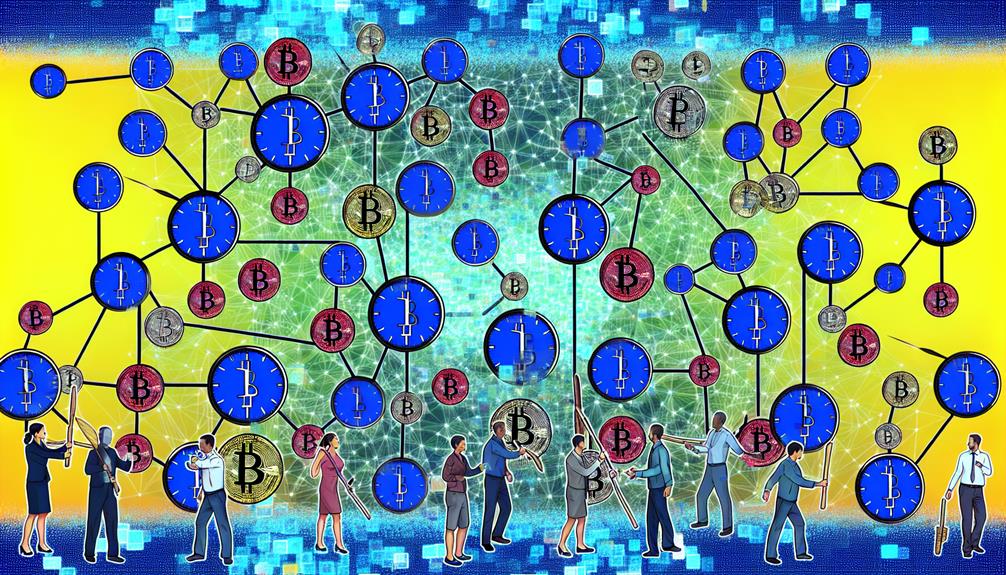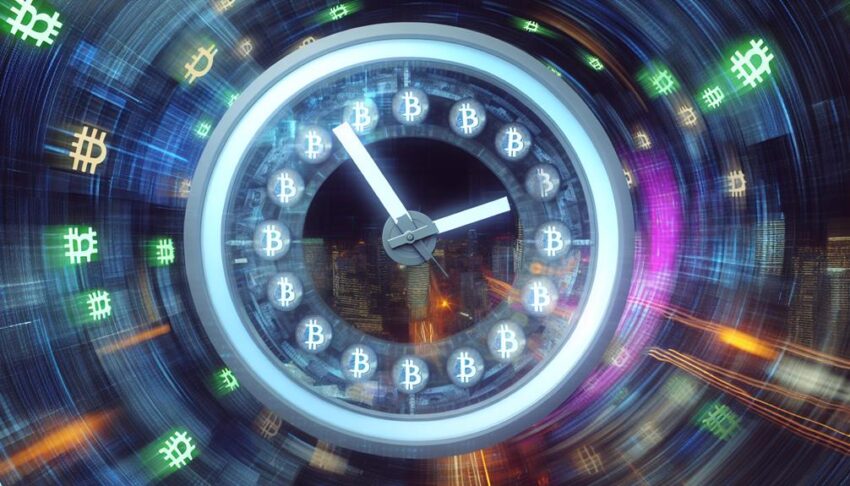When you're sending Bitcoin, you might find yourself wondering exactly how long it'll take for that transaction to go through. It usually ranges from about 10 to 30 minutes, but various factors can greatly impact this timeline. For instance, network congestion and the transaction fees you choose play essential roles in how quickly your Bitcoin gets confirmed. If you're curious about how to navigate these complexities and possibly speed things up, there are some strategies you can consider that could make all the difference.
Factors Affecting Transaction Speed

When considering how long it takes for a Bitcoin transaction to complete, several factors come into play that can greatly affect its speed. One major factor is blockchain congestion, which occurs when the network experiences a high volume of transactions. During peak times, the number of pending transactions can exceed the capacity of the blockchain, leading to delays. If you're trying to send Bitcoin during such a period, you might find your transaction stuck in the mempool, waiting for confirmation.
Another vital element is node performance. Each Bitcoin transaction must be verified by nodes within the network, and their processing capabilities can vary considerably. If you're connected to a node with subpar performance or if it's overloaded, your transaction may take longer to be confirmed. The efficiency of the node you're using can directly impact the speed at which your transaction is propagated throughout the network.
Moreover, the transaction fee you attach can also influence speed. Higher fees typically incentivize miners to prioritize your transaction, especially in a congested environment. If you're willing to pay a premium, your transaction is more likely to be processed quickly. Conversely, a lower fee may result in delays, particularly during high congestion periods.
Average Bitcoin Transaction Times
Transaction speeds can vary widely, but on average, a Bitcoin transaction typically takes about 10 minutes to be confirmed. This average isn't a strict rule, as transaction confirmation times can fluctuate based on several factors, including network congestion and the transaction fee you choose to pay.
Bitcoin operates on a decentralized network where transactions are grouped into blocks. Each block has a size limit of 1 megabyte, which restricts the number of transactions that can be processed in each block. When you initiate a transaction, it enters a pool of unconfirmed transactions known as the mempool. Miners select transactions from this pool based on the fees attached; higher fees generally lead to quicker confirmations.
If the network is busy, it may take longer than 10 minutes for your transaction to be confirmed, especially if the block size is nearing capacity. In times of high traffic, miners prioritize transactions with higher fees, resulting in longer wait times for lower-fee transactions.
Moreover, the average confirmation time can also be influenced by the overall health of the Bitcoin network, including the total hash rate, which reflects the computing power used to secure the network. While your transaction may be visible on the blockchain almost immediately, the actual confirmation, which solidifies its position in the blockchain, can still take that average 10 minutes or longer, depending on the aforementioned factors. Understanding these dynamics can help you better navigate the Bitcoin transaction landscape.
Peak Times and Delays

During periods of high network activity, Bitcoin transactions can experience significant delays, which is essential to understand for effective planning. When the number of transactions exceeds the capacity of the network, you encounter network congestion. This congestion leads to longer confirmation times as miners prioritize transactions based on fees paid. If you're sending Bitcoin during peak times, it's important to be aware of the following factors:
- Block Size Limits: Bitcoin's block size is capped at 1MB, which constrains the number of transactions that can be included in each block. When the network gets busy, this limitation becomes apparent, resulting in delayed confirmations.
- Transaction Volume: High demand can flood the network with transaction requests, exacerbating delays. When the volume spikes, the time it takes for your transaction to be confirmed can increase dramatically.
- Optimal Timing: Understanding when peak times occur can help you plan your transactions better. Weekends and major market events often see increased activity, so it might be wise to avoid these times for sending Bitcoin.
Transaction Fees and Speed
Network congestion not only affects confirmation times but also greatly influences transaction fees. When the Bitcoin network experiences high demand, the number of transactions waiting to be processed escalates, leading to a backlog. Miners prioritize transactions with higher fees, meaning if you're sending Bitcoin during peak periods, you might have to pay considerably more to guarantee your transaction is confirmed promptly.
Transaction fees are dynamic and can fluctuate based on several factors, including network congestion. When the network's capacity is strained, you'll often see fees increase as users compete to have their transactions included in the next block. This situation creates a direct correlation between the urgency of your transaction and the fee you're willing to pay. If you opt for a lower fee during these times, your transaction may linger in the mempool, delaying confirmation and potentially leading to frustration.
To navigate this landscape effectively, it's essential to stay informed about current network conditions. Tools and platforms provide real-time insights into transaction fees, allowing you to gauge the best fee to attach to your transaction. By understanding the interplay between transaction fees and network congestion, you can make informed decisions on when to send Bitcoin, balancing cost with speed. Essentially, being strategic about your transaction fees can greatly enhance the efficiency of your Bitcoin transactions, especially during periods of heightened network activity.
Tips for Faster Transactions

To guarantee your Bitcoin transactions are processed swiftly, there are several strategies you can employ. Understanding network congestion and how to enhance your transaction methods can greatly reduce wait times. Here are three effective tips:
- Choose Ideal Times for Transactions: Monitor network congestion to find the least busy times for sending your Bitcoin. Transactions tend to be processed faster during off-peak hours, so timing your transfers can make a vital difference.
- Increase Transaction Fees: While it might seem counterintuitive, raising your transaction fee can incentivize miners to prioritize your transaction. When the network is congested, those willing to pay higher fees often see their transactions confirmed more quickly. Be sure to check current fee rates to make an informed decision.
- Utilize Transaction Batching: If you're sending multiple transactions, consider transaction batching. This method allows you to combine multiple payments into a single transaction, reducing the overall fees and minimizing the load on the network. By doing this, you can avoid the pitfalls of congestion and enhance speed.
Alternatives to Bitcoin Transfers
When considering alternatives to Bitcoin transfers, several viable options can meet different needs and preferences. Each cryptocurrency offers unique features that can enhance your transfer experience.
Ethereum transfers are a popular choice, especially for those engaging in decentralized applications (dApps) or smart contracts. The Ethereum network can process transactions more quickly than Bitcoin, with an average block time of about 15 seconds. This speed makes it suitable for users who require timely transactions, though gas fees can vary considerably based on network congestion.
Litecoin transactions also provide a fast alternative. Designed as the "silver" to Bitcoin's "gold," Litecoin boasts a block generation time of approximately 2.5 minutes. This faster confirmation time can be beneficial for users looking for efficient peer-to-peer transactions without the volatility often associated with Bitcoin.
Ripple efficiency stands out in the domain of cross-border payments. Ripple's consensus algorithm allows for near-instantaneous transactions, typically settling in under five seconds. This efficiency is particularly attractive for banks and financial institutions aiming to streamline their operations.
Lastly, Stellar speed offers another rapid alternative, especially for remittances and microtransactions. Stellar's consensus protocol enables quick transactions, often completing in just a few seconds. Combined with low transaction fees, Stellar is ideal for users needing a cost-effective solution.
Frequently Asked Questions
Can Bitcoin Transactions Be Reversed Once Confirmed?
Once a Bitcoin transaction's confirmed, it achieves transaction finality; it can't be reversed. You should guarantee accuracy before sending, as confirmed transactions are immutable, meaning mistakes can't be corrected after the confirmation stage.
What Happens if a Transaction Takes Too Long?
If you experience transaction delays due to network congestion, your transaction might take longer to confirm. This can result in increased frustration, as you'll need to wait for the network to process pending transactions.
Are There Limits on Bitcoin Transaction Amounts?
In the domain of digital currency, limits on Bitcoin transaction amounts exist, often influenced by transaction fees and network congestion. You'll find larger transactions may incur higher fees, impacting your overall experience and efficiency.
Can I Send Bitcoin Anonymously?
You can send Bitcoin with varying degrees of privacy, but complete anonymity's challenging. Transaction tracking on the blockchain exposes your activity, so using privacy-focused tools may enhance your Bitcoin privacy, but risks still exist.
How Do Bitcoin Wallets Affect Transaction Time?
Bitcoin wallets impact transaction time based on wallet types and transaction fees. Higher fees can prioritize your transaction in a congested network, while certain wallet types may have different processing speeds, affecting overall efficiency.
Conclusion
So, while you might think sending Bitcoin is as quick as a text message, the reality can be a bit more complicated. With network congestion, transaction fees, and peak times playing their parts, you could find yourself waiting longer than expected—unless you're willing to pay up for priority. Ironically, in the world of digital currency designed for speed, patience is still a virtue. If you want rapidity, maybe consider sending a carrier pigeon instead!
